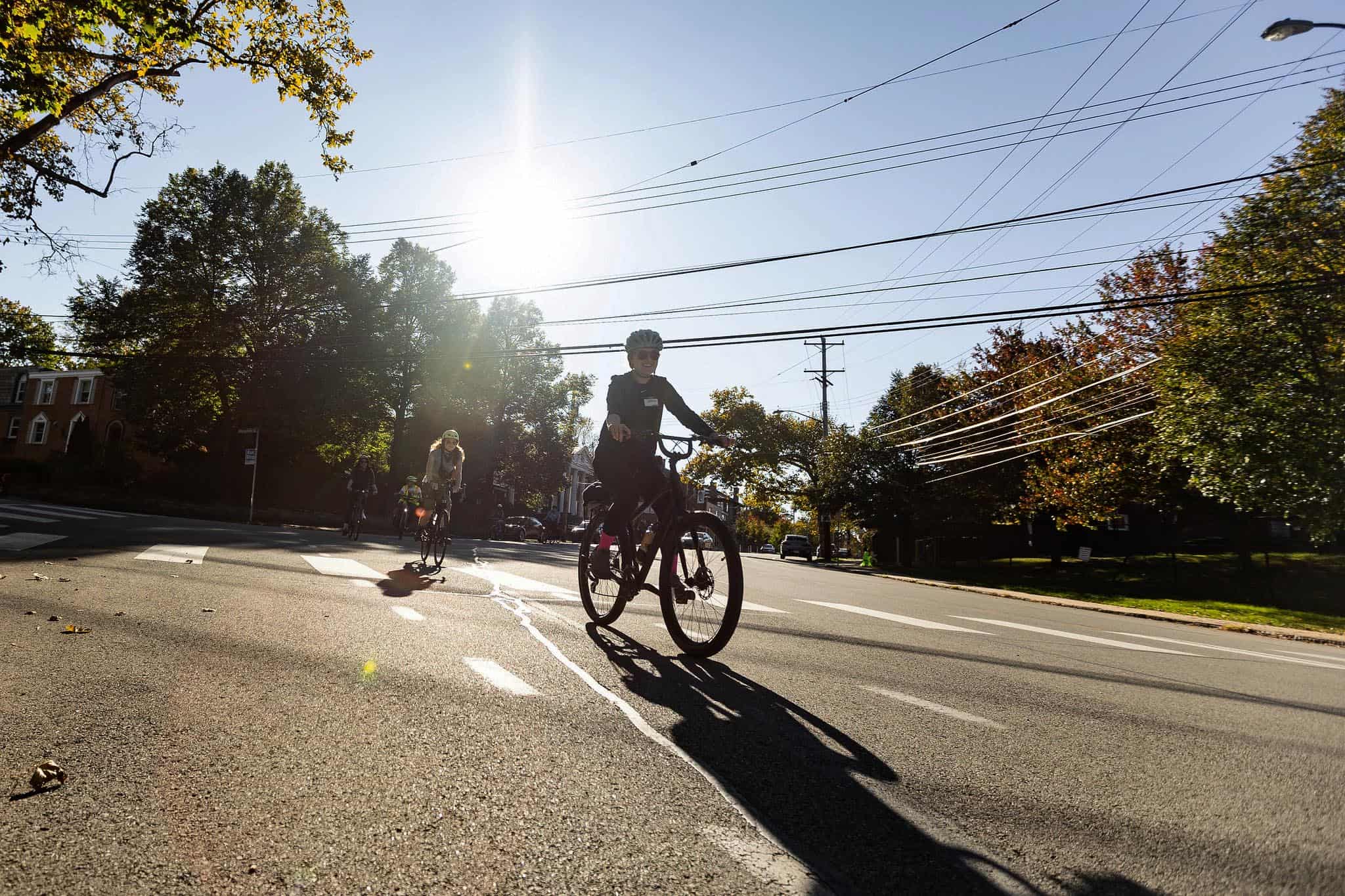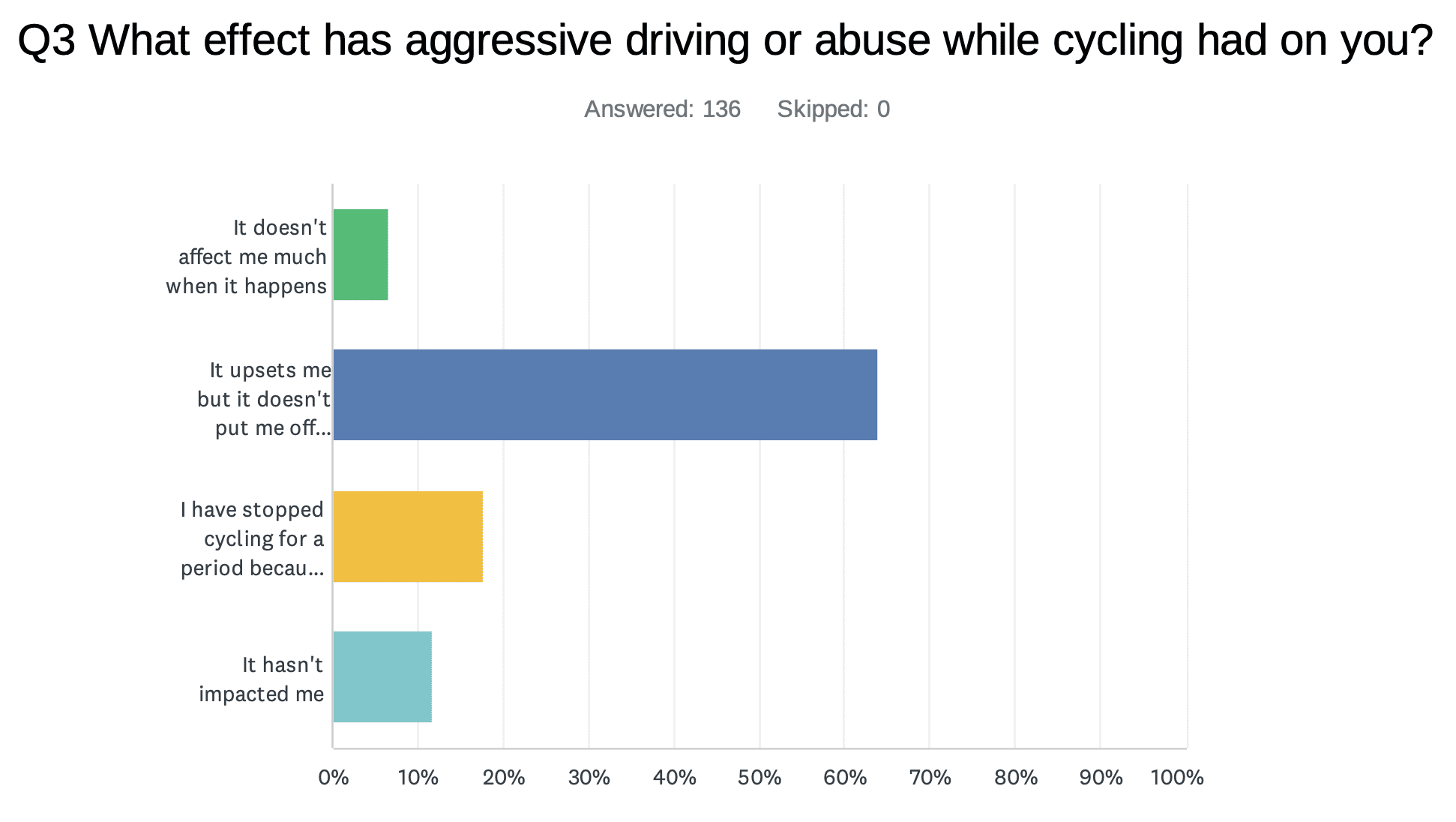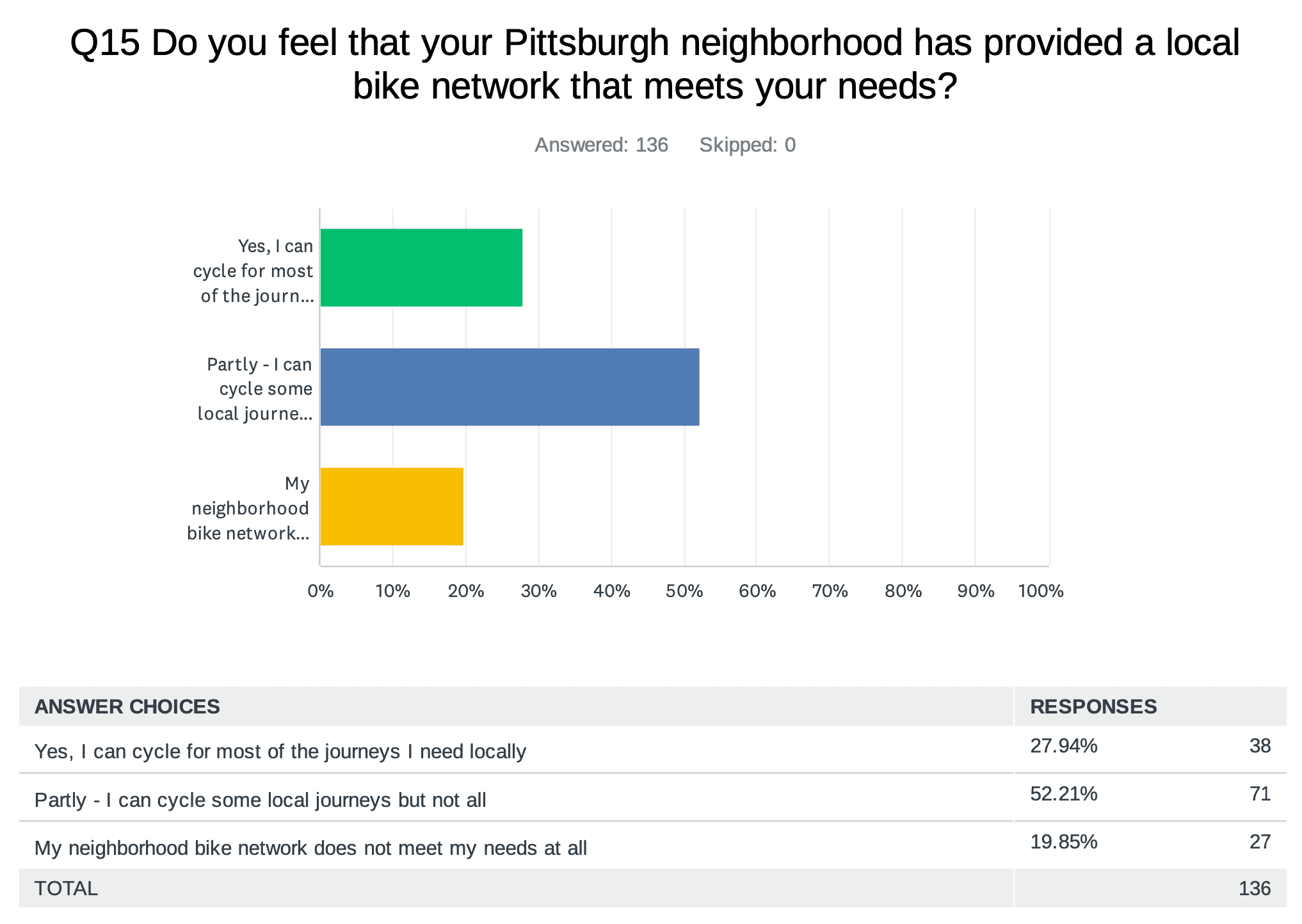
Our survey reveals the levels of street harassment that women and non-binary Pittsburghers face while riding a bike
DeAnna Srock, Eric Boerer, and Avocet Greenwell contributed to this article
According to US Census Data, in Pittsburgh there are more than three times as many men using a bike as their primary means to commute to work than women. While Pittsburgh’s male commuter rate is on par with notably bike friendly US cities such as Seattle and Boston, the female commuter rate compares to much less bike-friendly places.
Transportation choices are complex, and there is no single reason for this disparity, so we thought it would be useful to try to understand some of the reasons that women and non-binary Pittsburghers may be leaving the bike at home.
Unfortunately, both physical and verbal harassment of bicyclists from drivers is a common occurrence in the US, and Pittsburgh is no exception. Over the years, we’ve heard many harrowing stories of drivers doing and saying horrendous things to people riding bikes, often putting them into harm’s way. Does this harassment prevent people from riding bikes in the first place or get them to give up riding for daily trips altogether?
“I was stopped at a red light and a car pulls up extremely close to me at the red light. The passenger rolls his window down and says something about my legs (catcalling me) and tries to grab my leg. I felt trapped between the car and the curb as it was difficult to back up or leave the situation.”
Our survey, inspired by similar surveys conducted in London and Portland, Oregon, seeks to understand if and how such targeted, gendered street harassment is impacting Pittsburghers who ride bicycles. We opened our survey to women, trans, and nonbinary people in the greater Pittsburgh area. Questions explored topics from the prevalence and frequency of street harassment while biking, to whether cyclists have changed their routes – or stopped biking altogether – as a result of the aggressive behavior they’ve faced. Additionally, we asked what these cyclists want to see elected leaders prioritize to help ensure their safety.
We hope that these personal experiences, stories and data will raise awareness to the very real problem of getting harassed for nothing more than riding a bicycle to get somewhere.
Why Gender + Biking?
“Once I was biking up Penn from Negley (before the neighborway existed), and a driver yelled out of his car at me to “get off the goddamn road”. He passed me, then I passed him because of traffic. I made it home and just as I was taking my bike inside I noticed the same driver pulled up in front of my house, and got out of his car. He started yelling at me again. I ran inside and locked the doors. He continued to stalk around my house for about 10 minutes, including walking into the alley to look into the back windows of my house.”
Throughout sharing this survey – and in some of the survey responses – a question that repeatedly popped up from people was, “why is a bike advocacy organization focusing on gender?”
BikePGH’s core values include Equity, Inclusivity, and Safe Access. Combined, these values express the vision that “people of all abilities, incomes, ages, genders, and ethnicities … are able to easily and safely access all the things they need in life without relying on a car.”
Women and gender minorities experience increased and documented barriers to safe cycling. In a 2017 study on street harassment, two-thirds of participants reported experiencing their first harassment at or before the age of 14, contributing to an early gap that tells girls, children of color, and LGBTQ children that walking and cycling are unsafe environments for them.
In addition to verbal harassment, a 2019 study from the University of Minnesota showed that women cyclists are nearly four times as likely to be closely and dangerously passed by vehicles as their male counterparts.
“I’ve also had drivers drive beside me and yell what they probably think is encouraging things to me, but just makes me uncomfortable…they are driving so close to me and not paying attention to what they are doing.”
One survey respondent questioned whether motorists would really look that closely at a cyclist’s gender presentation before dangerously and illegally passing too close, but implicit bias impacts many of our interactions with the world, and driving is certainly no exception. In striving to create a walkable, bikeable, and equitably mobile city for all road users, the intersections and experiences of vulnerable identities are important to understand and address.
Key takeaways
“Driver yelled at me and my 11 year old daughter that we shouldn’t be biking on that road (road is a small road – 25 mph speed limit, residential”
We received 136 submissions over the month that the survey was live. Of these, about 15% of respondents have children, but only half of them ride bikes on local journeys with their kids. Additionally, 18% live with a disability or a chronic health issue.
The immediate finding that stands out is that Pittsburghers are a resilient bunch.
37% of respondents reported that drivers use their vehicles to intimidate them, such as purposely passing too close, tailgating, or accelerating at them while riding at least once per week. That number goes up to 69% for those who experience these types of physical intimidation at least once per month.
“Honking really loudly right next to me -screaming “get off the road” when I am in a clearly defined bike lane or in a shared road with the bike symbol displayed prominently on it -revving the motor right next to me -passing too close on purpose”

But despite 18% facing at least weekly verbal abuse from drivers – with 60% experiencing at least monthly verbal aggression – the vast majority (64%) of respondents shared that these incidents upset them, but didn’t put them off from cycling.

“I’ve been whistled at and called a slut. I’ve had a bus driver open their door as they passed to yell at me. I’ve been pulled over by a cop and told to bike in the parking lane.”
Our open ended questions revealed several depressing trends. For instance, ten respondents reported being “catcalled” or sexualized while riding. Dozens of respondents reported incidents of being called gendered, racist, or homophobic epithets, or having sexual obscenities yelled at them, while at least six had projectiles such as a soda bottle thrown at them.
“A man catcalled me and slowed down to match my pace. When I turned to get away from him, he followed me. I ignored him until he drove off. It was really frightening.”
Unfortunately, 18% have stopped cycling for a period because of the harassment that they experienced.
“People yelling and/or swearing at me and getting too close to my bike with their cars. I actually stopped cycling because it felt too scary.”
Many did not stop biking, but we found that fear of how other road users treat them caused them to alter their route or choices for when to ride. For instance, 64% of respondents alter their route, even if it’s out of the way, due to not feeling safe from other people. Overall, 16% do not feel safe cycling at all after dark because of how they’ve been treated, while 35% of respondents say that they will not cycle through an unlit park, path, or other isolated route after dark by themselves. This is clearly a factor preventing many people from commuting by bike during the winter months at all.
“I was on Wild Place biking up the hill. There was a section where the bike line was obstructed so I was legally on the road. A driver blew his horn the entire time and when I was able to get back into the bike lane he deliberately crossed over the line and tried to make me swerve into the curb. I was able to stay steady and avoid an accident. Barely.”
Conclusions

One thing is clear: bike infrastructure, or the lack thereof, is something that many respondents think would help. Respondents indicated that they would like elected leaders to prioritize building safe, connected cycling networks to local places, and if in place would increase their bicycle trips for things such as errands & services, shopping, and rides with friends & family.
“We absolutely need better biking/transit infrastructure, but if the general population is indifferent to maybe killing a stranger because it will save them a few seconds on their commute how do you combat that? “
However, bike lanes and traffic calming are not enough. The car culture where people think it’s OK to verbally and physically harass people for merely riding their bike needs to end. This demeaning and insulting aggressive behaviour no doubt affects people’s transportation choices and is likely a factor in decreasing the number of women and non binary bicyclists in Pittsburgh and beyond.
“I have stopped commuting to work because of the treatment of cyclists. Especially through the Strip as I work downtown. I don’t know how to fix this as it feels like a cultural issue”
See our website for more information about our WMNBikePGH Program.
Click to view the full results of the survey.
To stay updated, subscribe to our newsletter:
